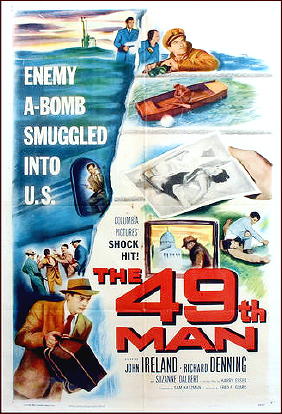
THE 49th MAN
US, 1953, 70 minutes, Black and white.
John Ireland, Richard Denning, Touch Connors.
Directed by Fred Sears.
The 49th. Man is one of many small B-budget supporting features made in the '50s - science fiction with a message. In production values they were quite straightforward, almost semi-documentary. They also had their social and political value - this film puts forward the American point of view of the time, the cold war, the arms race, the memories of Hiroshima, the possibilities of the bomb being dropped ('Some little firecracker we developed could be dropped in our own backyard').
The film shows American integrity, war games - with the entertaining touch of espionage. Contemporary audiences will find the hasty dropping of the. bomb out in the desert away from civilisation in order to save San Francisco somewhat naive. In this way, the film is a useful look at '50s film-making on nuclear issues.
1. Entertaining B-budget thriller? Nuclear issues? 'Fifties? Now?
2. The quality of B-budget thrillers: taut, brief, direct plots, mood, atmosphere?
3. Black and white photography, international locations, the U.S., Washington? Marseilles (on the Hollywood backlot)? Semi-documentary style? Cabaret songs? Atmospheric score?
4. The title, the credits and the cut-out figures, the puzzle, the focus?
5. 'Fifties and cold war issues, U.S. supremacy, Los Alamos and nuclear developments, the Atomic Energy Commission? Suspicion of the Soviet Union? Espionage, infiltration? Memories of Hiroshima (and visuals of atomic blasts)? The atmosphere of propaganda films of the time? Fear for the United States e.g. San Francisco? Propaganda? In retrospect?
6. The plot: the initial accident and investigation, the discovery of the plot? Williams and his investigations? The documentary style of the discovery of so many cases with the bomb parts? The hypothesis of bringing the parts into America separately and assembling the bomb on American soil? The New York Harbor sequence? The international flavour? Marseilles, the connections, Williams' cover on the ship, the musicians, the cabarets, the agents in Marseilles, on the ship?
7. The revelation of the war game? Audience reaction to Williams and his discovery, the security connection, the crew of the ship? Williams' escape in Washington, phoning Reagan? The audience suspicious of authority? The theme of vigilance? The war game - and all things were possible?
8. The final clues, the musician, the music unions, the chase, San Francisco, the plane?
9. The defusing of the bomb, the decision to drop it in the desert -and the naivety of this in retrospect?
10. The portrait of U.S. officials, networks, loyalties? Spies, skills, networks and loyalties?
11. The assumptions about nuclear arms, American supremacy, the comparisons and arms race with the Soviet Union?